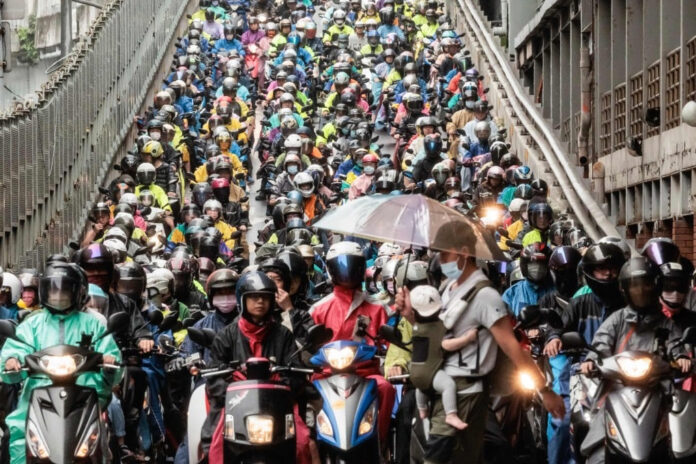Taipei, Taiwan — In a move to address the ongoing labor shortage in Taiwan’s manufacturing sector, the Taiwanese government has reached an agreement with India to bring in 1,000 Indian workers. This decision follows a Memorandum of Understanding (MOU) signed earlier this year and was solidified during a working-level meeting between officials from both countries in Taipei on November 5.
The agreement marks a significant step towards addressing Taiwan’s pressing need for labor in industries like electronics, machinery, and assembly, where shortages have been growing in recent years. According to Tsai Meng-liang (蔡孟良), head of the Ministry of Labor’s Workforce Development Agency, this will be the first batch of Indian workers to enter Taiwan under the MOU.
No Fixed Timeline Yet for Arrival of Indian Workers
While the agreement was officially finalized, Tsai Meng-liang confirmed that the exact timeline for the arrival of Indian workers remains unclear. Labor Minister Ho Pei-shan (何佩珊) had previously indicated that the first batch of workers could arrive as early as mid-2025. However, Tsai clarified that more discussions were needed to iron out the specifics, such as the recruitment process, legal procedures, and the logistics of bringing workers to Taiwan.
“There are still basic issues that need to be resolved, including recruitment procedures and the necessary groundwork,” Tsai said at a news conference. “It’s not as simple as signing a deal. We need to ensure everything is in place for the workers to arrive and settle here.”
Tsai also referenced Japan’s experience after it signed a similar agreement with India. Japan took almost a year to begin bringing in workers after finalizing their deal, indicating that Taiwan’s timeline could be extended depending on the complexities involved.
Key Details of the Agreement
The agreement between Taiwan and India will allow 1,000 workers to be brought in for employment in various sectors, with the majority of these workers entering Taiwan through labor brokerages verified by both countries. However, 5% of the workers (about 50 people) will be directly recruited by Taiwanese companies.
According to Tsai, the workers will be subject to Taiwanese labor laws, which include qualifications related to their job roles. Though no specific qualifications for Indian workers were finalized, English proficiency is expected to be preferred, given the international nature of many manufacturing companies in Taiwan.
Addressing Concerns and Potential Discrimination
Tsai also addressed concerns that have emerged regarding the integration of Indian workers into Taiwanese society, especially amid broader discussions on migrant labor. Some critics have raised concerns about the social and cultural impact of bringing workers from India, but Tsai dismissed these as discriminatory.
“The crime rate in India is no higher than that of many developed countries, and the crime rate among migrant workers in Taiwan is actually less than 50% of the crime rate among Taiwanese citizens,” Tsai responded.
He emphasized that the Indian workers would be subject to the same background checks and regulations as other foreign workers in Taiwan, noting that migrant labor has long been an integral part of Taiwan’s manufacturing workforce.
Indian Delegation Visits Taiwan to Discuss Labor Issues
A delegation from India, led by Surinder Bhagat, joint secretary for overseas employment under India’s Ministry of External Affairs, visited Taiwan between November 4 and 7 to discuss the details of the agreement and observe Taiwan’s work environment. The delegation’s visit also included discussions on worker welfare, the working conditions, and other matters vital for the smooth integration of Indian workers into Taiwan’s labor market.
Chart: Key Agreement Details
| Aspect | Details |
|---|---|
| Number of Workers | 1,000 |
| Recruitment Process | 5% directly hired; 95% via verified labor brokers |
| Preferred Qualifications | English proficiency preferred, no other specifics confirmed |
| Timeline for Arrival | Mid-2025 estimated, but subject to ongoing discussions |
| Country of Origin | India |
| MOU Signed | February 2024 |
| Delegation Visit | November 4-7, 2024 |
What This Means for Taiwan’s Labor Market
Taiwan has faced significant labor shortages in various sectors, particularly in manufacturing. The agreement with India is seen as a critical step to alleviating these shortages and ensuring that Taiwanese companies can continue to compete in global markets. Indian workers will fill the gap in positions that Taiwanese workers have shown little interest in, such as manual labor and assembly line jobs, which are often low-paying and labor-intensive.
What Are the Next Steps for Taiwanese-Indian Labor Cooperation?
While the MOU is now in place, the actual process of bringing workers to Taiwan will depend on further negotiations and the finalization of recruitment procedures. The Taiwan Ministry of Labor will work with the Indian government to ensure that workers’ rights are protected and that they have the necessary support systems in place upon arrival.
Frequently Asked Questions (FAQs)
1. When will Indian workers start coming to Taiwan?
The exact timeline is uncertain, but the Taiwanese government is aiming for mid-2025. However, some groundwork still needs to be completed before the workers can begin arriving.
2. How many Indian workers will Taiwan bring in?
Initially, 1,000 Indian workers will be brought to Taiwan as part of the agreement between the two countries.
3. Will the Indian workers be directly hired by companies in Taiwan?
Yes, 5% of the workers will be hired directly by Taiwanese companies, while the rest will be recruited through verified labor brokerages.
4. What qualifications will Indian workers need?
While no specifics have been finalized, English proficiency is expected to be preferred, and workers will be subject to Taiwanese labor laws.
5. Why have some expressed concerns about the integration of Indian workers?
Some concerns have been raised about the potential social impact, but these concerns have been addressed as discriminatory. Taiwan’s labor minister pointed out that the crime rate among migrant workers in Taiwan is lower than that of local citizens.
